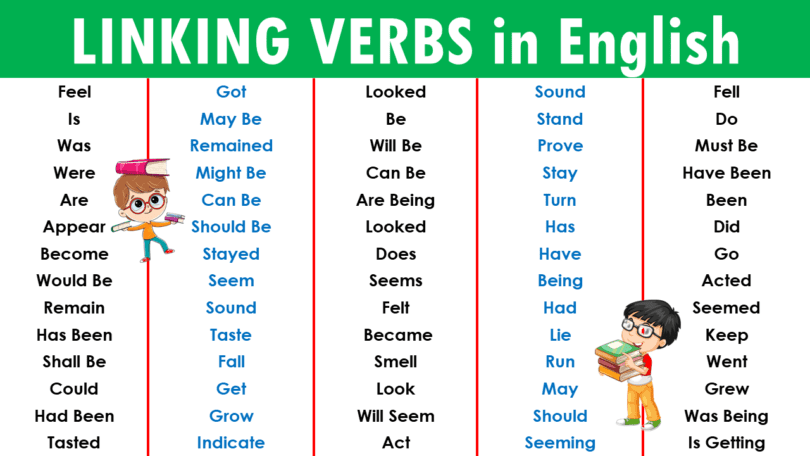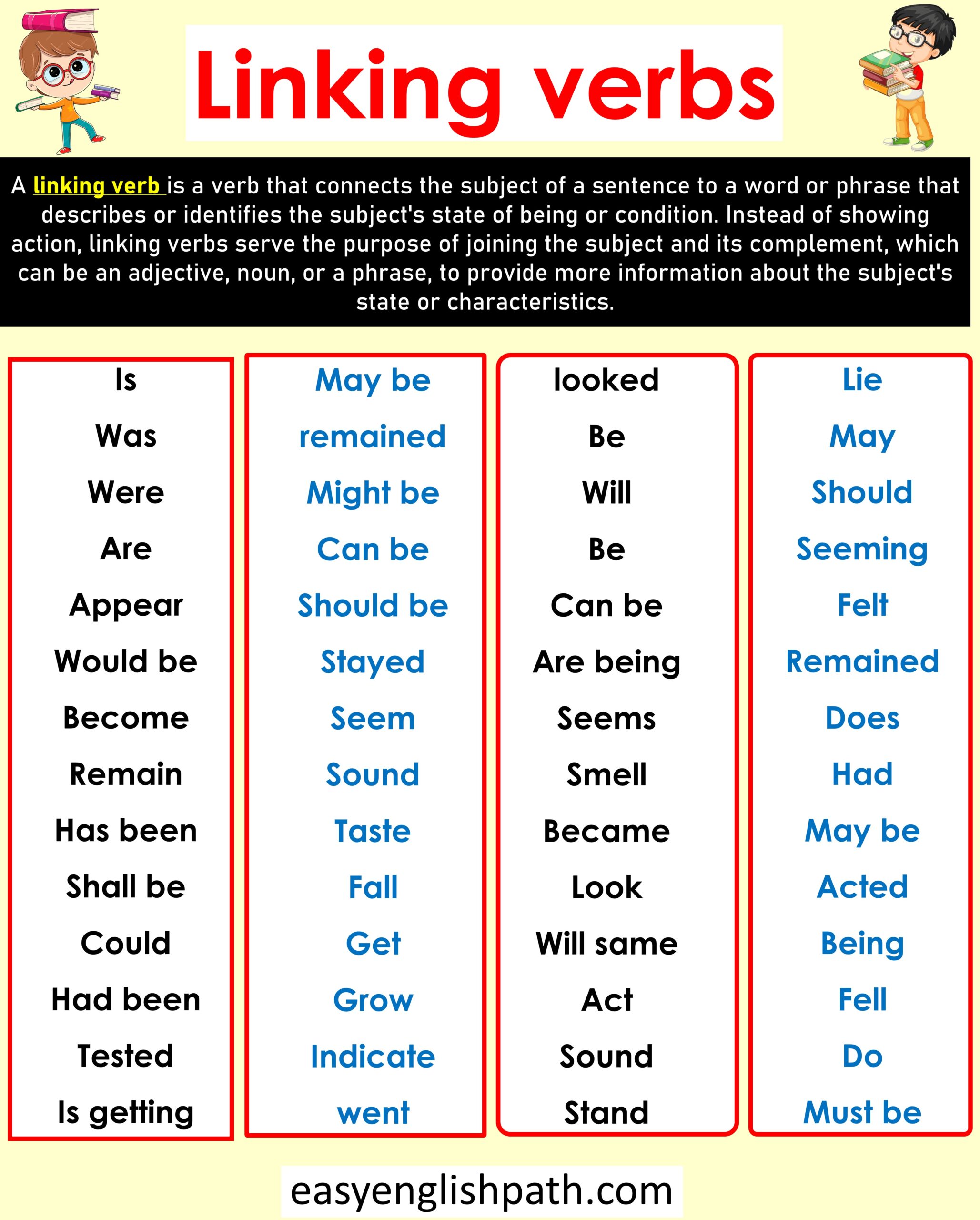Linking verbs connect the subject to a state or description rather than showing action. They help describe what something is or looks like. For example, in She is happy, is links she to happy. Understanding linking verbs is essential for expressing states, conditions, and descriptions in sentences.
What is a linking verb?
A linking verb connects the subject to a noun or adjective that renames or describes it, rather than showing action. For example, in The cake smells delicious, smells links cake to delicious, describing its state.
How to Use Linking Verbs?
1. Identify the Subject:
The subject can be the person, thing, or idea that the sentence is about. For example, in the sentence ‘The flowers smell sweet. The flower is the subject.
2. Choose the Linking Verb:
Common linking verbs include BE which is the root of different verbs like (am, is, are, was, were, etc.), become, seem, appear, feel, look, taste, sound, and remain.
3. Connect the Subject to the Subject Complement:
The subject complement is the word or phrase that follows the linking verb and describes or renames the subject. For example, in the sentence ‘She is happy’ Happy is the subject complement.
Rules for Linking Verbs
Linking verbs do not show action but connect the subject to a noun or adjective that provides more information about it. They describe a state of being rather than an action.
1. Linking verbs do not show action
They link the subject to a description rather than expressing an action.
- The flowers are beautiful.
- She is a teacher.
2. Common linking verbs include be, seem, become, appear, feel, look, sound, and smell
These verbs help describe a state or condition rather than an action.
- The soup smells good.
- He looks tired.
3. Linking verbs are followed by a subject complement (not an object)
They take an adjective or noun, not an adverb.
✔ He feels happy.
❌ He feels happily. (Incorrect)
4. Some verbs can be both linking and action verbs
Some verbs function as both linking and action verbs depending on usage.
- She looks happy. (Linking – describes her state)
- She looks at the painting. (Action – describes what she is doing)
List of linking Verbs with Examples
| Linking Verb | Sentence |
|---|---|
| Be | She is happy. |
| Become | He became a doctor. |
| Seem | She seems tired. |
| Appear | The star appears bright. |
| Feel | He feels cold. |
| Look | You look tired. |
| Taste | The soup tastes salty. |
| Sound | The music sounds melodic. |
| Remain | She remains calm. |
| Stay | They stay focused. |
| Keep | He keeps busy. |
| Turn | The milk turned sour. |
| Grow | The plant grows tall. |
| Run | The saucepan runs dry. |
| Lie | The book lies open. |
| Stand | The statue stands tall. |
| Fall | The leaves fall gracefully. |
| Get | He got tired. |
| Smell | The flowers smell sweet. |
| Continue | The music continues playing. |
| Would Be | It would be easy for you to walk in these shoes. |
| Did | Why did you seem like this? |
| Act | He acted like a weird person. |
| Keep | You have to keep a secret. |
| Went | He went there for nothing. |
| Grew | The tree grew against the wall. |
| Was Being | He was being narcissistic. |
| Have Been | I have been here for a long time. |
| Been | It’s been two years since she has been behaving like this. |
| Must Be | You must be normal at that time. |
Common Mistakes with Linking Verbs
Linking verbs connect the subject to additional information rather than showing action. Misusing them can lead to grammatical errors.
1. Using an Adverb Instead of an Adjective
Linking verbs should be followed by an adjective, not an adverb.
❌ He feels badly.
✔ He feels bad.
2. Confusing Linking Verbs with Action Verbs
Some verbs can be both linking and action verbs, so context matters.
❌ She looks the painting carefully. (Incorrect if “looks” is meant as a linking verb)
✔ She looks at the painting carefully. (Action verb – correct)
✔ She looks tired. (Linking verb – correct)
3. Using an Object Instead of a Subject Complement
Linking verbs take a subject complement (a noun or adjective), not a direct object.
❌ She became a doctor’s assistant her career.
✔ She became a doctor’s assistant.
4. Incorrectly Using the Progressive Form
Most linking verbs are not used in continuous tenses.
❌ She is being happy today.
✔ She is happy today.
FAQs on Linking Verbs
1. What is a linking verb?
A linking verb connects the subject to a noun or adjective that describes or identifies it, rather than showing action. (She is a teacher.)
2. How is a linking verb different from an action verb?
A linking verb describes a state or condition, while an action verb shows movement or activity. (He feels tired vs. He runs fast.)
3. Can linking verbs be used in continuous tenses?
Most linking verbs cannot be used in continuous forms. (She is being happy ❌ → She is happy ✔).
4. What follows a linking verb?
A subject complement (a noun or adjective), not a direct object. (He became a doctor.)
5. Can a verb be both linking and action?
Yes, some verbs function as both. (She looks happy → linking, She looks at the sky → action.)
You May Also Like






